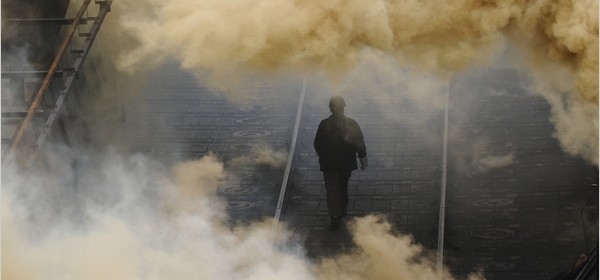Climate report offers a grim forecast

What happened
A United Nations panel of the world’s leading environmental
scientists issued its most dire warnings
on the dangers posed by climate
change, saying global warming is already affecting
every continent and threatens to devastate
food supplies, cause mass extinctions of plants and
animals, worsen droughts, and raise the risk of
wars over resources. The longer society holds off
on cutting emissions of planet-heating greenhouse
gases, said the report from the Intergovernmental
Panel on Climate Change, the greater the damage
will be. “Nobody on this planet is going to
be untouched by the impacts of climate change,”
said panel Chairman Rajendra Pachauri. Scientists
said that rising oceans and droughts could displace
hundreds of millions of people by the end of
the century, causing trillions of dollars of damage.
Surging temperatures have already lowered corn
and wheat yields, the report noted, and farmers could
soon struggle to meet the world’s food demands.
The 2,500-page report was released at a critical time, as governments
prepared to negotiate a new deal to reduce greenhouse gas
emissions. To have any major impact, the agreement would
need the cooperation of the U.S.—which never ratified the 1997
Kyoto climate accord—and major energy users from the developing
world, particularly China and India.
What the editorials said
This alarming report should be a “call to action,” said the Los
Angeles Times. There is now overwhelming scientific evidence
that climate change is radically altering our planet. The mountain
snowpack in the western U.S. is shrinking, reducing the country’s
water supply. “Heat waves are becoming more frequent and more
intense.” If we care about the world we’re leaving our children,
we will now take serious steps to cut carbon emissions.
But “man-made global warming is still a theory, not established
science,” said the Washington Examiner. Yes, the average global
temperature did rise through much of the last century. But from
1997 to 2012 the temperature remained static,
even as Chinese power plants pumped out tons
of supposedly planet-warming carbon dioxide.
“The facts always seem to contradict the dire observations
of global-warming alarmists.”
What the columnists said
Climate change is clearly real, said Matt Ridley
in The Wall Street Journal, but the debate now
is between the alarmists and the “lukewarmers,”
who think its impact will be nowhere near as extreme
as this report claims. New research suggests
that our climate is less sensitive to carbon emissions
than previously thought, which means the
planet might warm by just 2 degrees Fahrenheit
in the next century—less than half the rise predicted
by the panel. Replacing fossil fuels with
expensive solar and wind energy to combat this
modest warming would be the economic equivalent
of taking “chemotherapy for a cold.”
That “false optimism” is dangerous, said Phil Plait in Slate.com.
By cutting our carbon emissions—phasing out dirty coal-burning
power plants, and improving vehicle fuel efficiency—we can slow
climate change’s worst effects, giving us time to “figure out what
steps to take next.” But if we listen to the skeptics and do nothing,
the results “will prove disastrous.” We will all have to make
sacrifices to survive this crisis, said Simon Jenkins in TheGuardian
.com. Environmentalists will have to drop their opposition to genetically
modified crops designed to cope with droughts. Conservatives,
meanwhile, will have to accept that the developing world
will need billions more dollars in aid—unless they want to be inundated
with climate refugees. “Nothing can be off-limits.”
Sadly, the world remains unwilling to act, said Philip Bump in
TheAtlantic.com. Developing nations such as China and India are
expected to build more than 1,000 coal-burning power plants in
the next few years, to meet the electricity demands of their fastgrowing
economies. Western governments could pass policies that
would reduce emissions, but won’t, out of fear of angering voters
with higher energy bills. After all, “it’s always easier to shell out
money for a disaster that has already happened.”
Source: The Week

 Print
Print